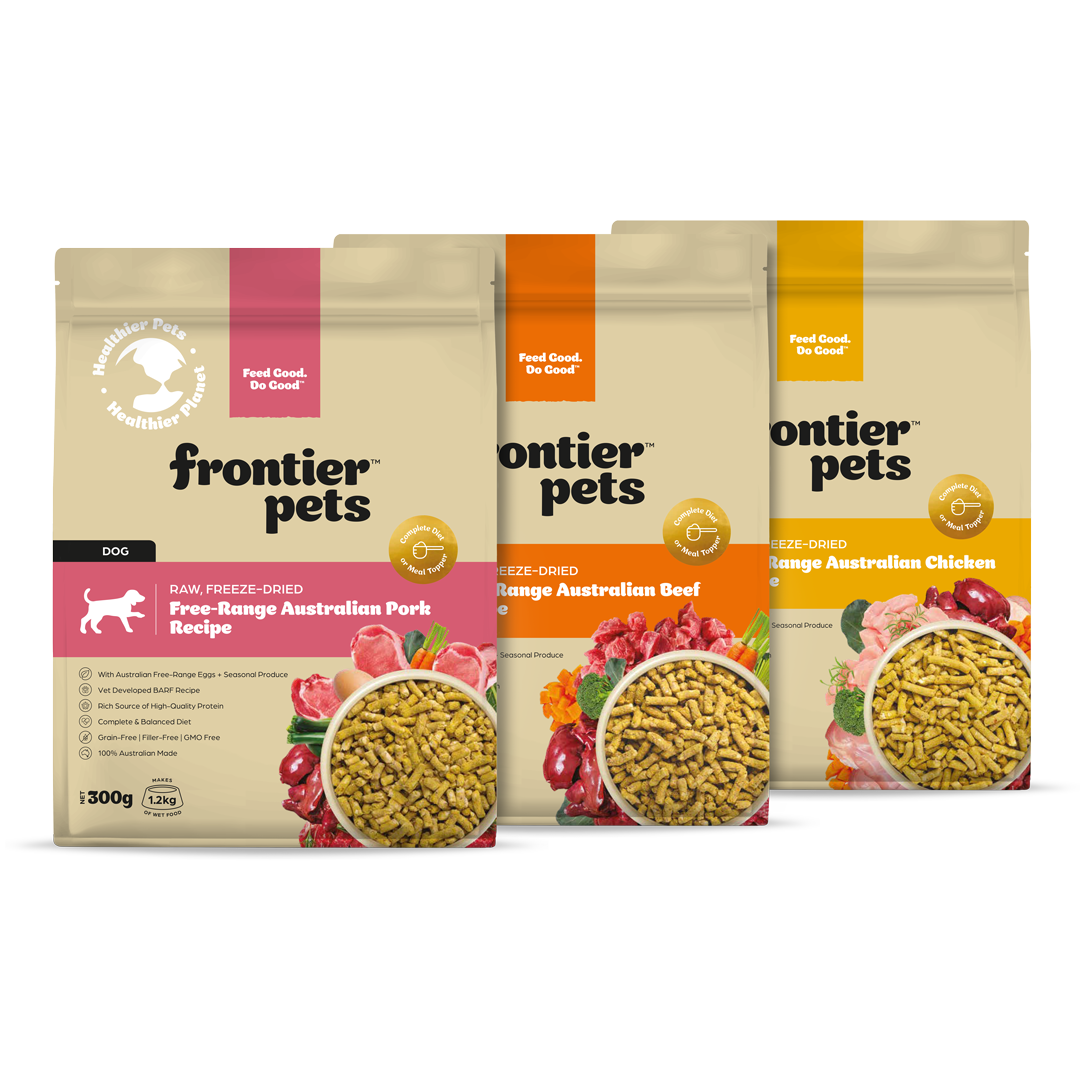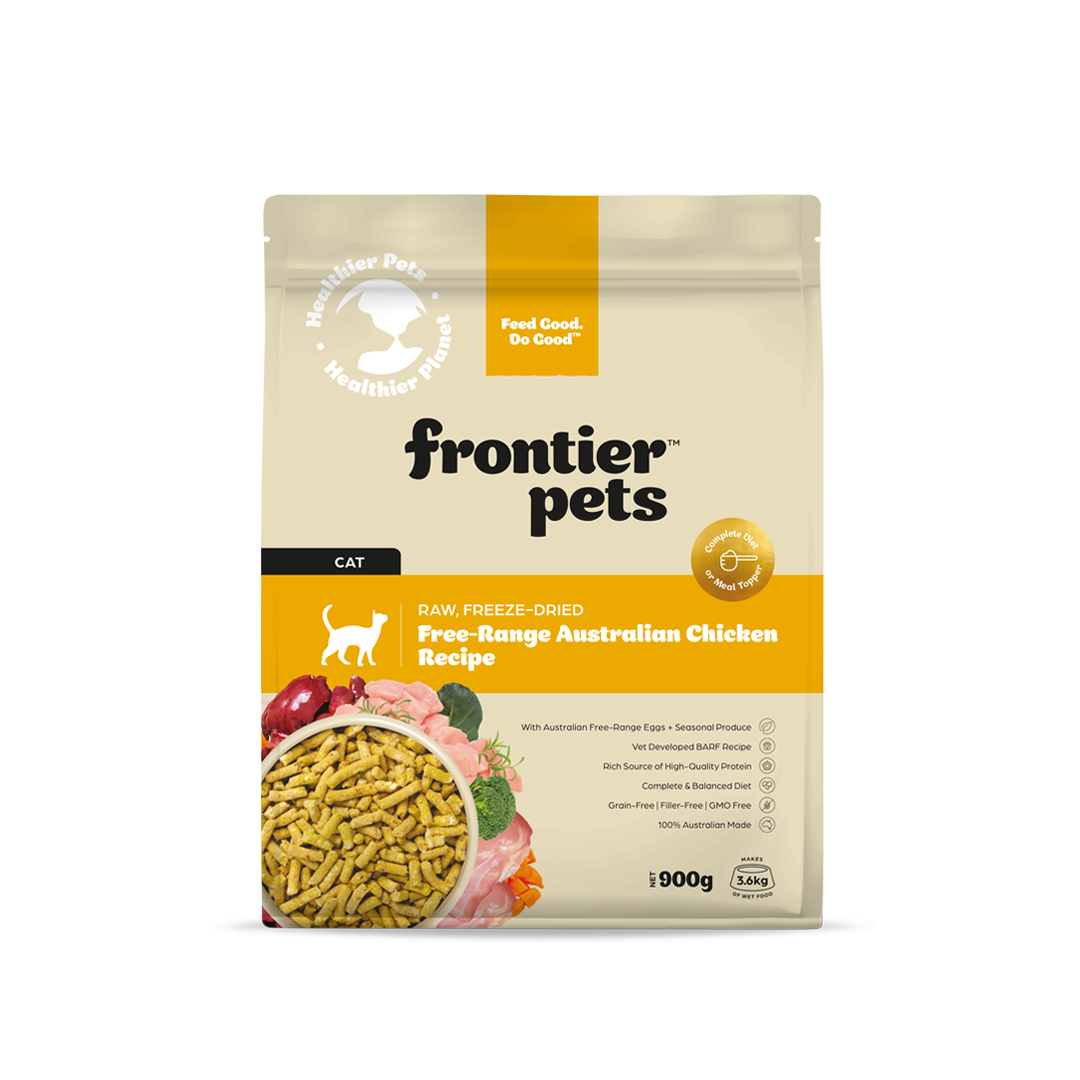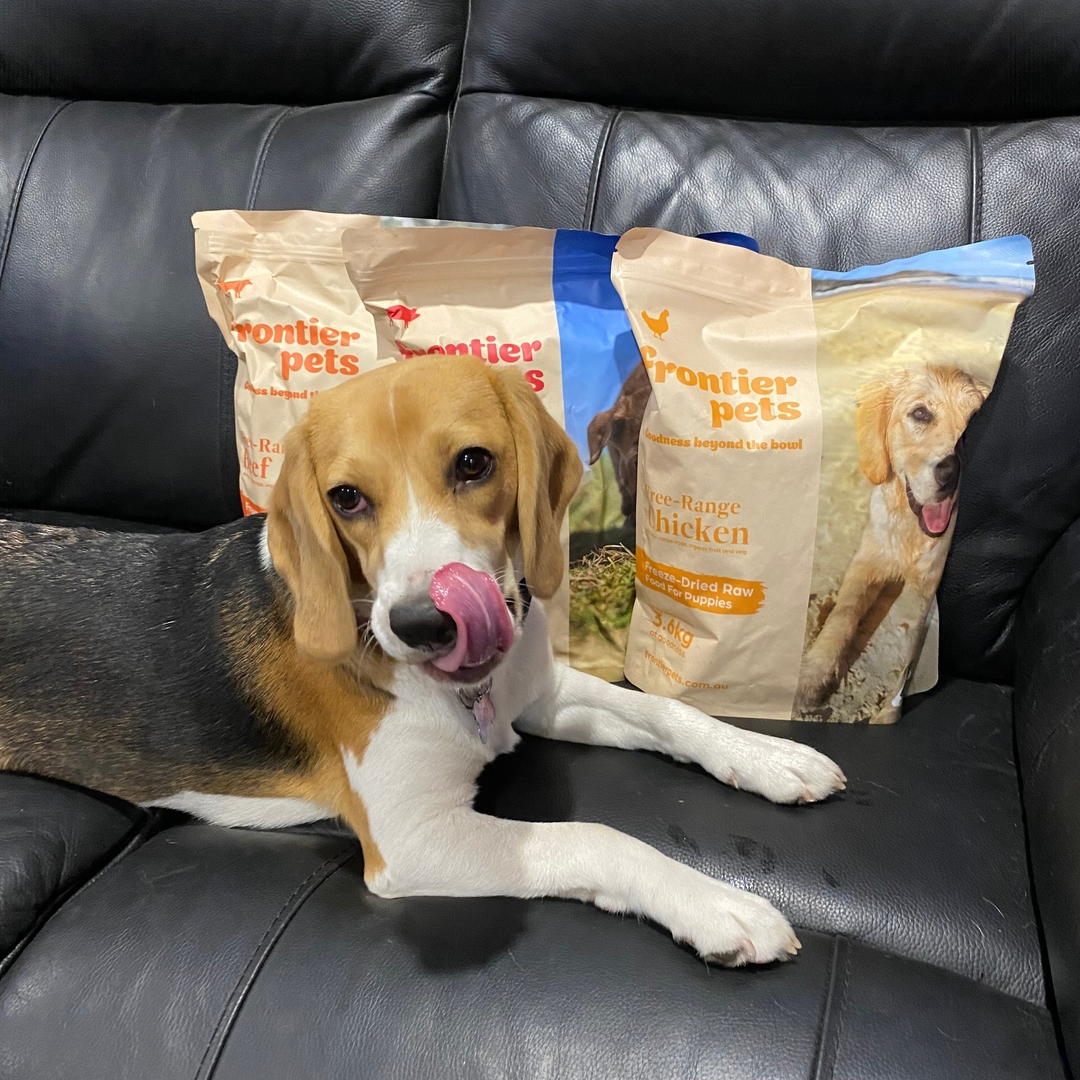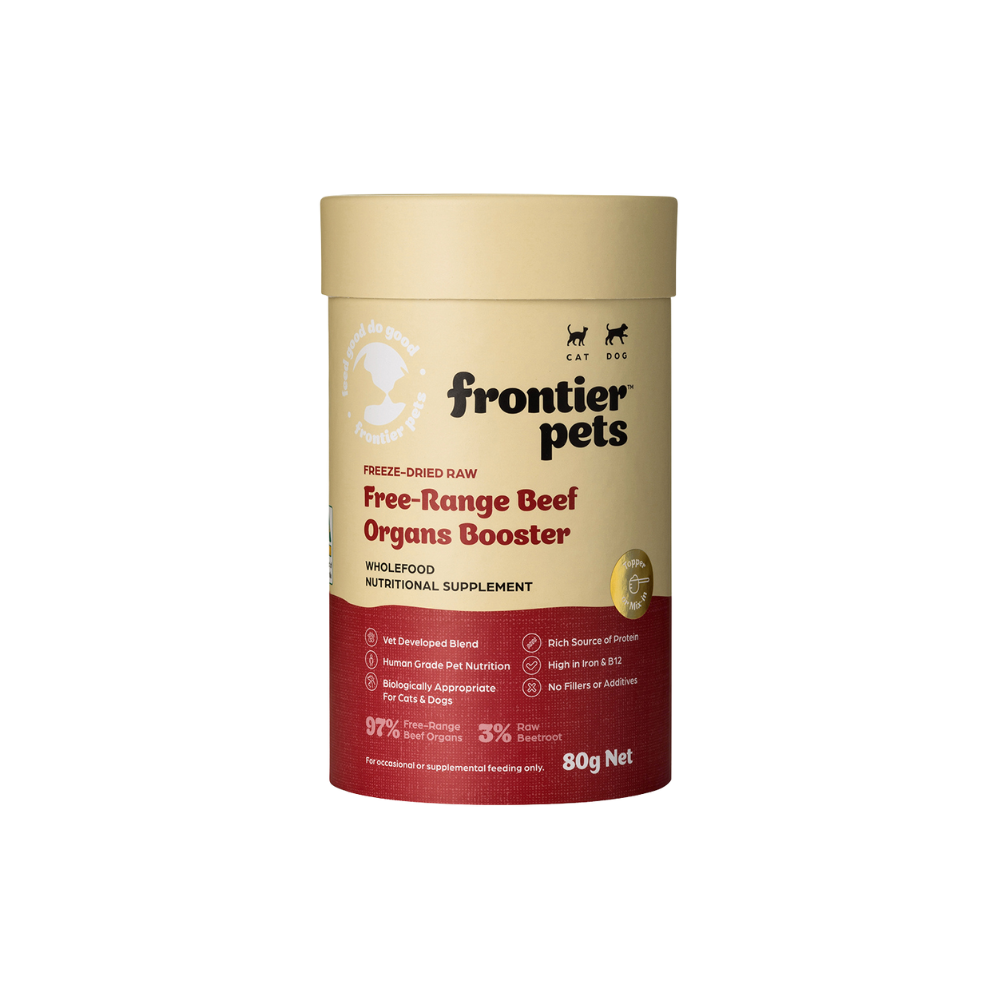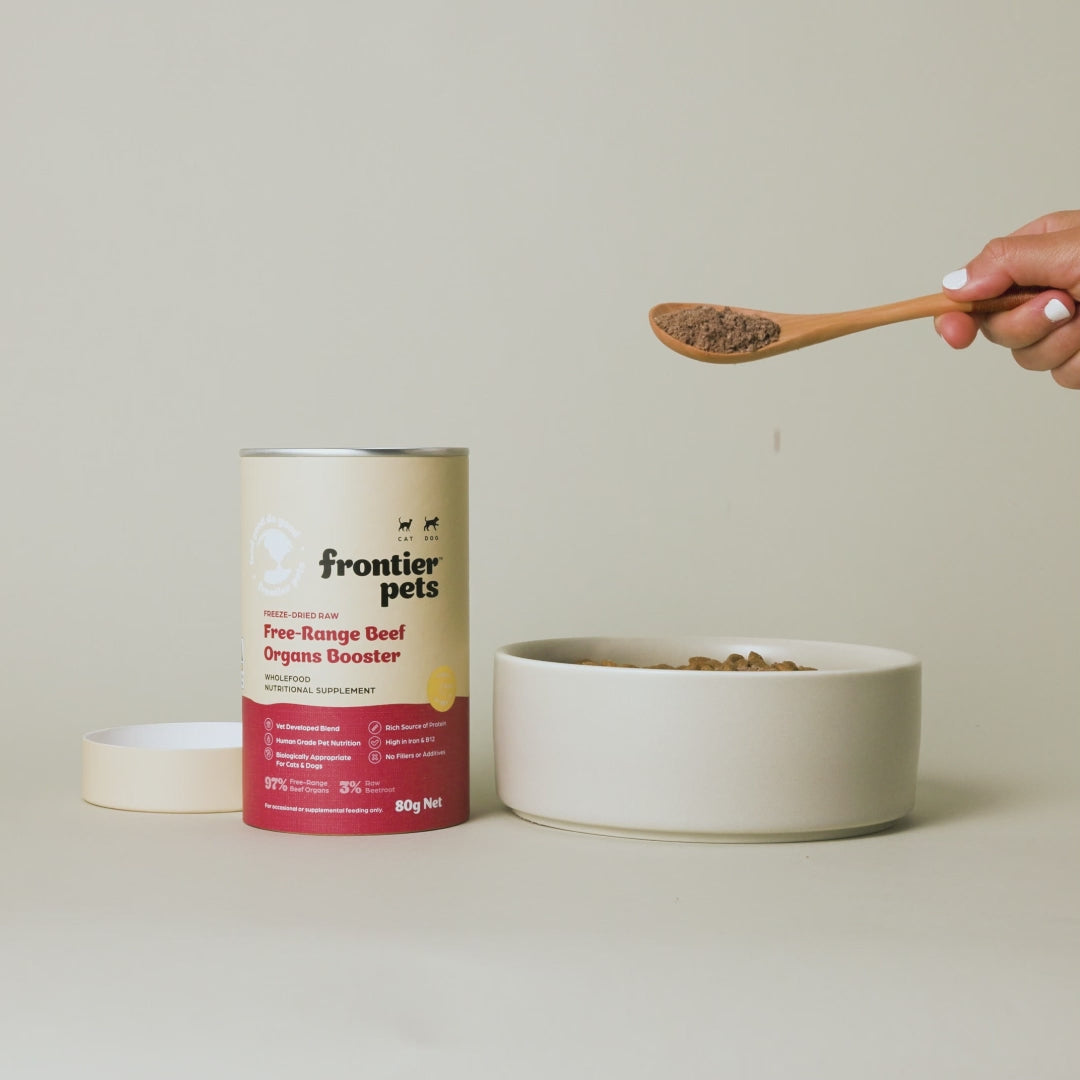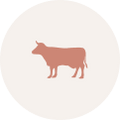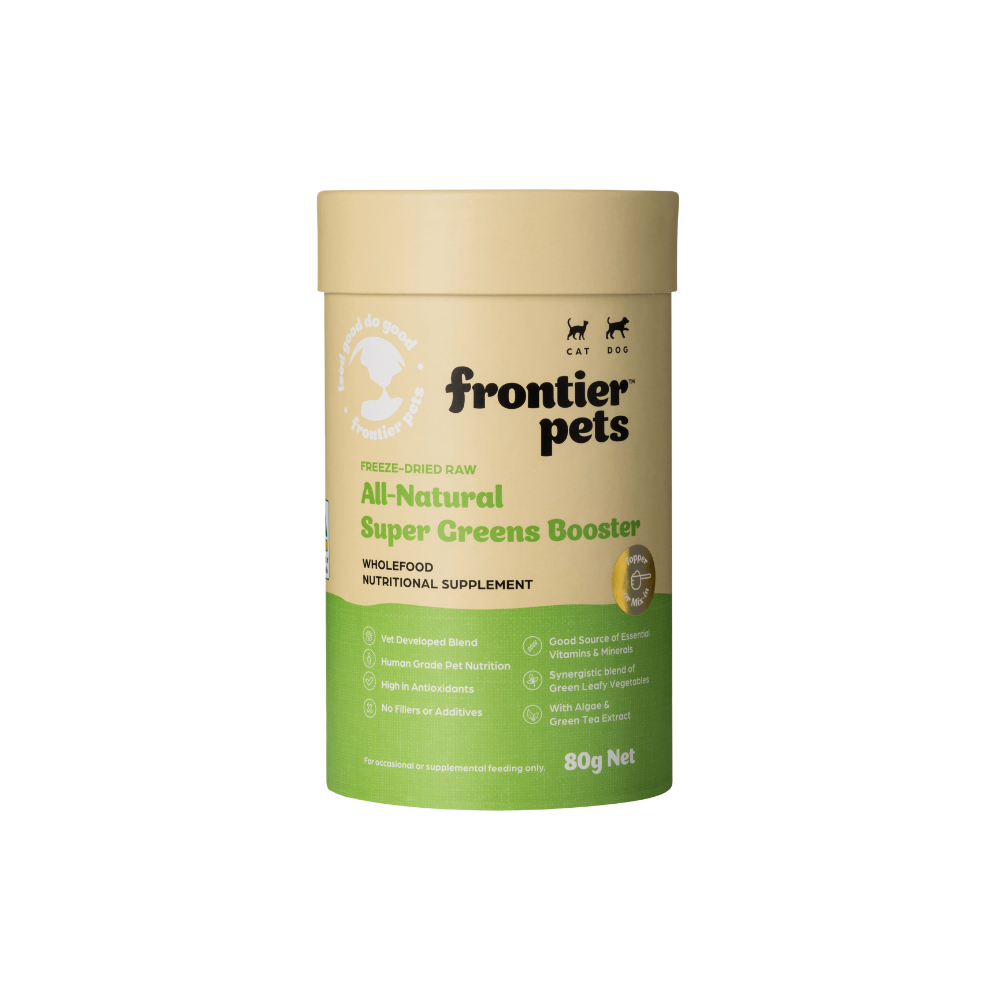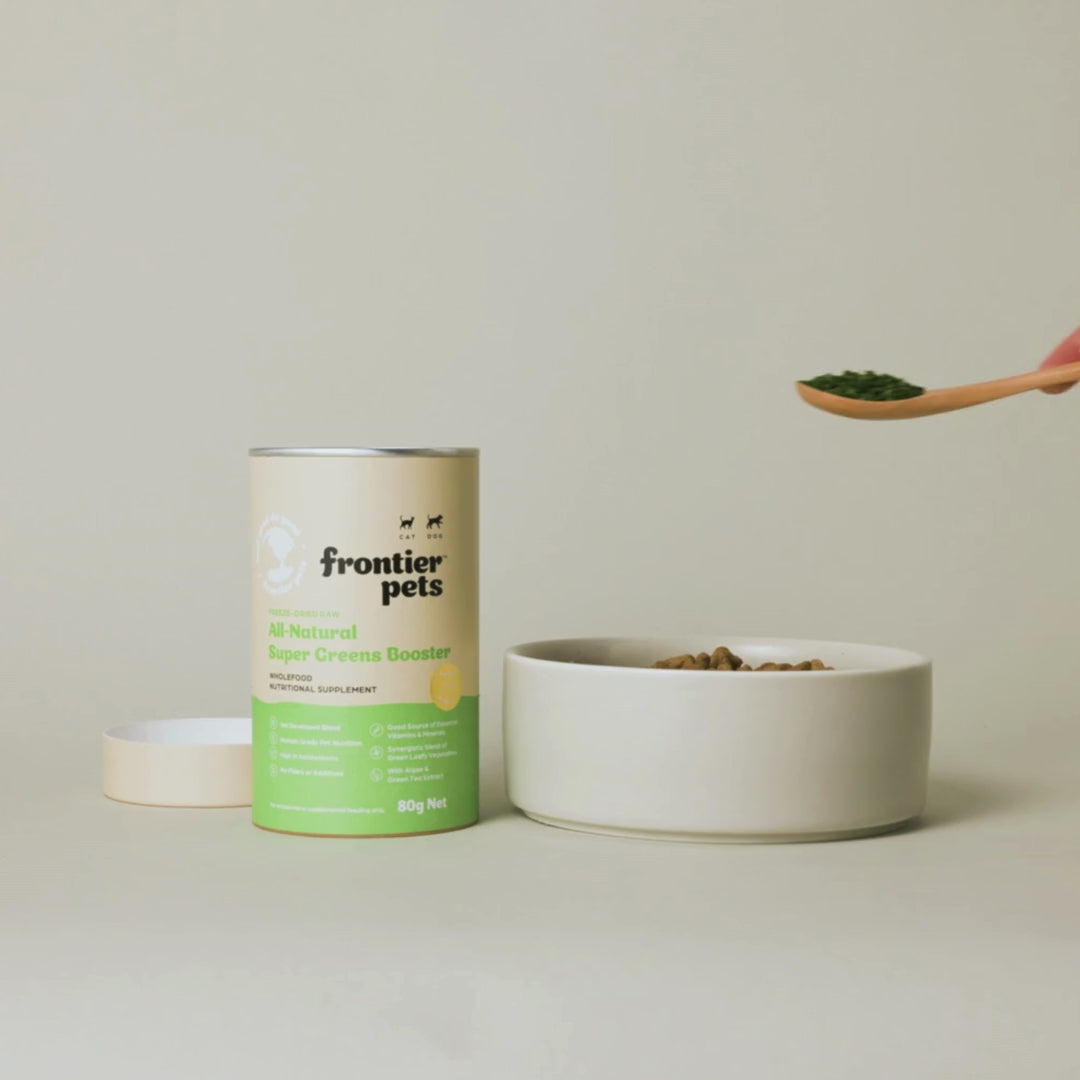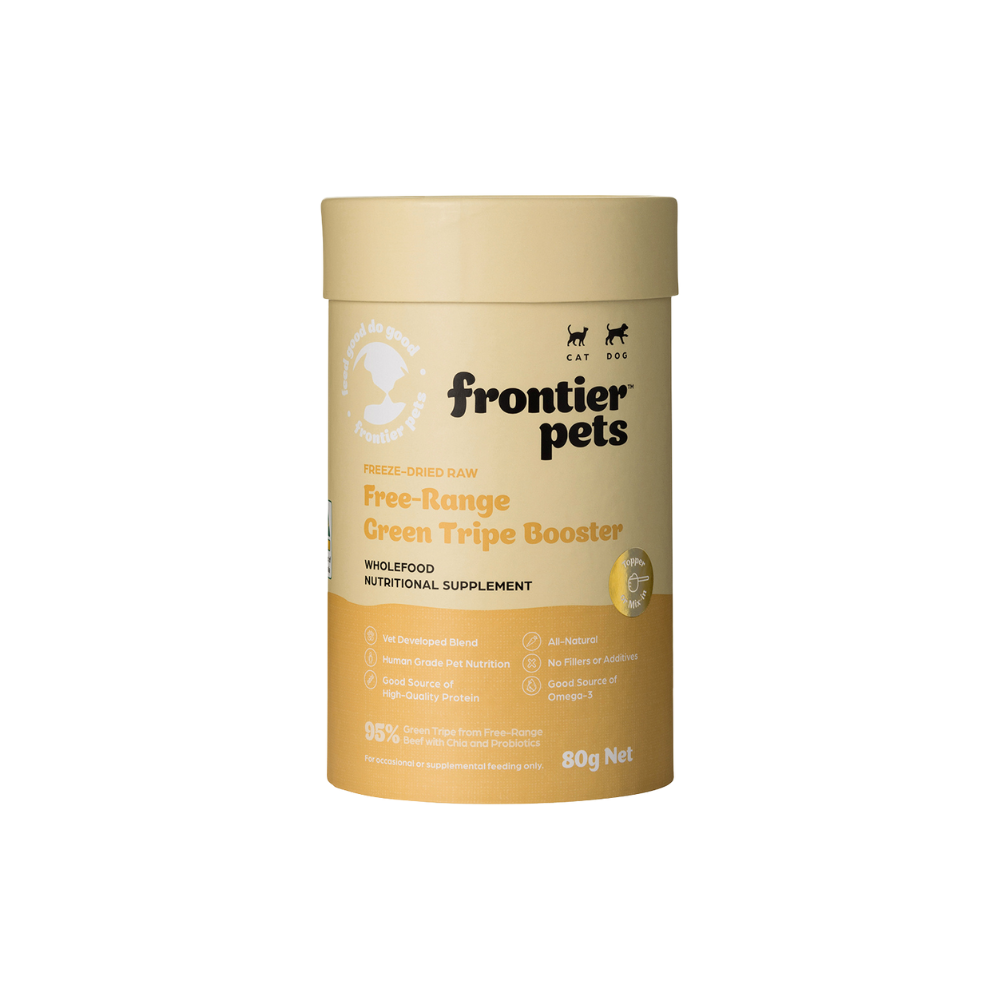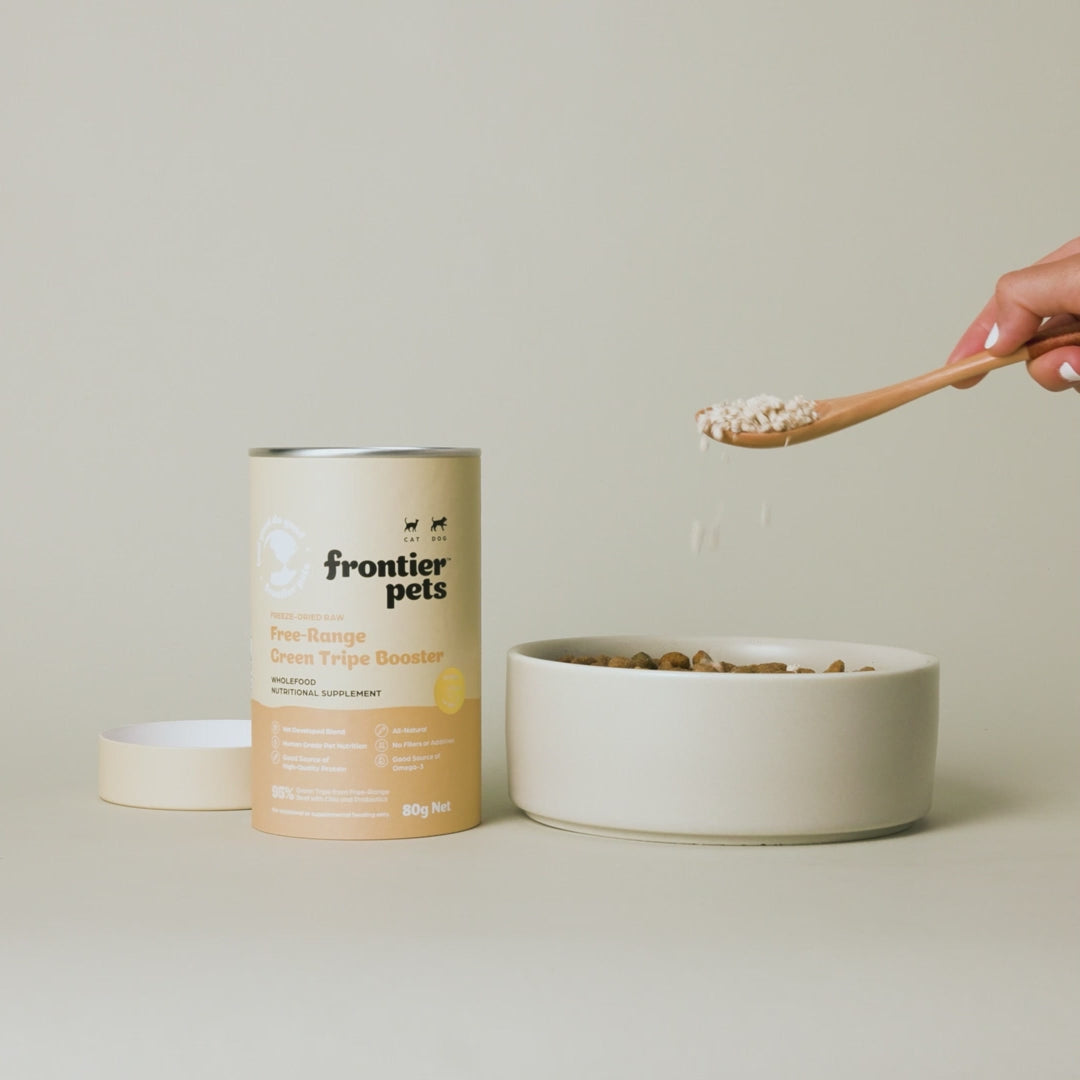Feeding Guides for Puppies
Welcome to our product feeding guides. These Puppy Daily Feeding Guides are a quick reference for the amount of Frontier Pets Freeze-Dried Raw Puppy Food based on their weight. It's important to remember that these are guides only. You may find that you require less or more food per day based on your puppy's age, condition and levels of activity. As the owner or carer of your beloved pet, you are the best person to judge how much food your puppy should require.
IMPORTANT: If your puppy is new to raw feeding, don't forget that you need to transition carefully. See our 'How To Transition to Raw Feeding' information here.
The following information is general advice, but as each pet is an individual, seek veterinary advice if you’re not confident or are concerned, particularly if you think your pet might have special dietary needs or has had a reaction to a standard or raw diet before.
![]() Free-Range Beef
Free-Range Beef
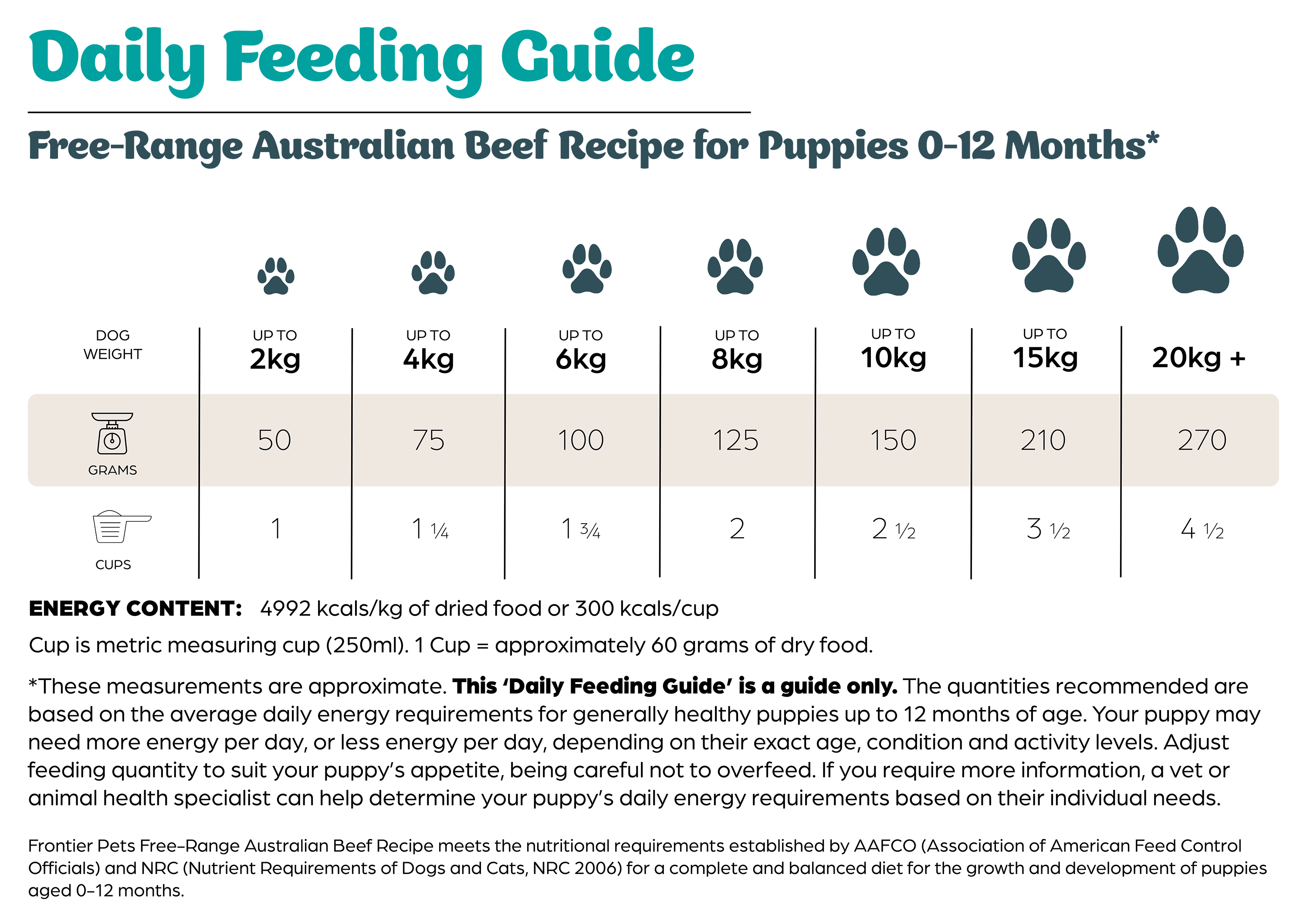
![]() Free-Range Chicken
Free-Range Chicken
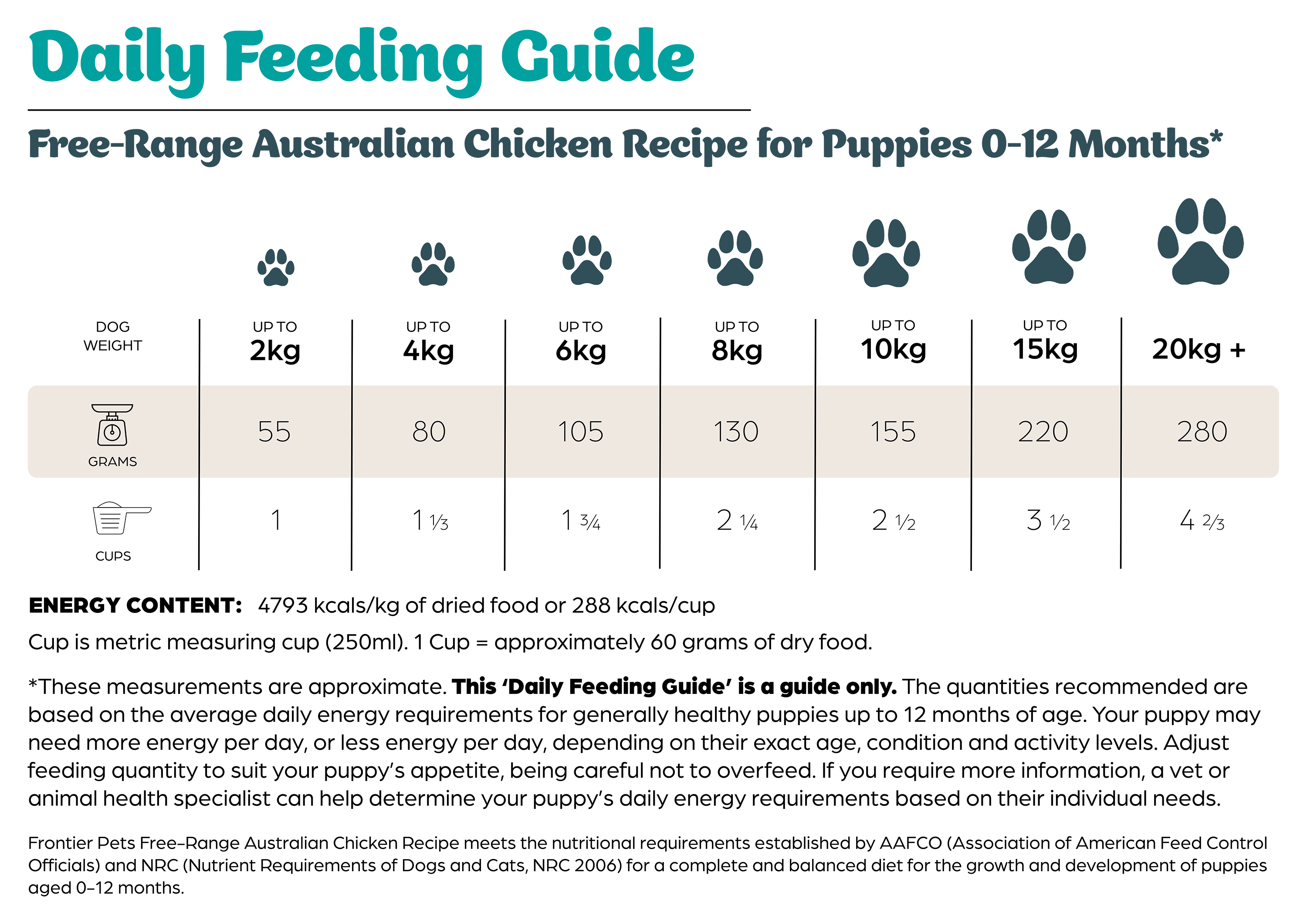
![]() Free-Range Pork
Free-Range Pork
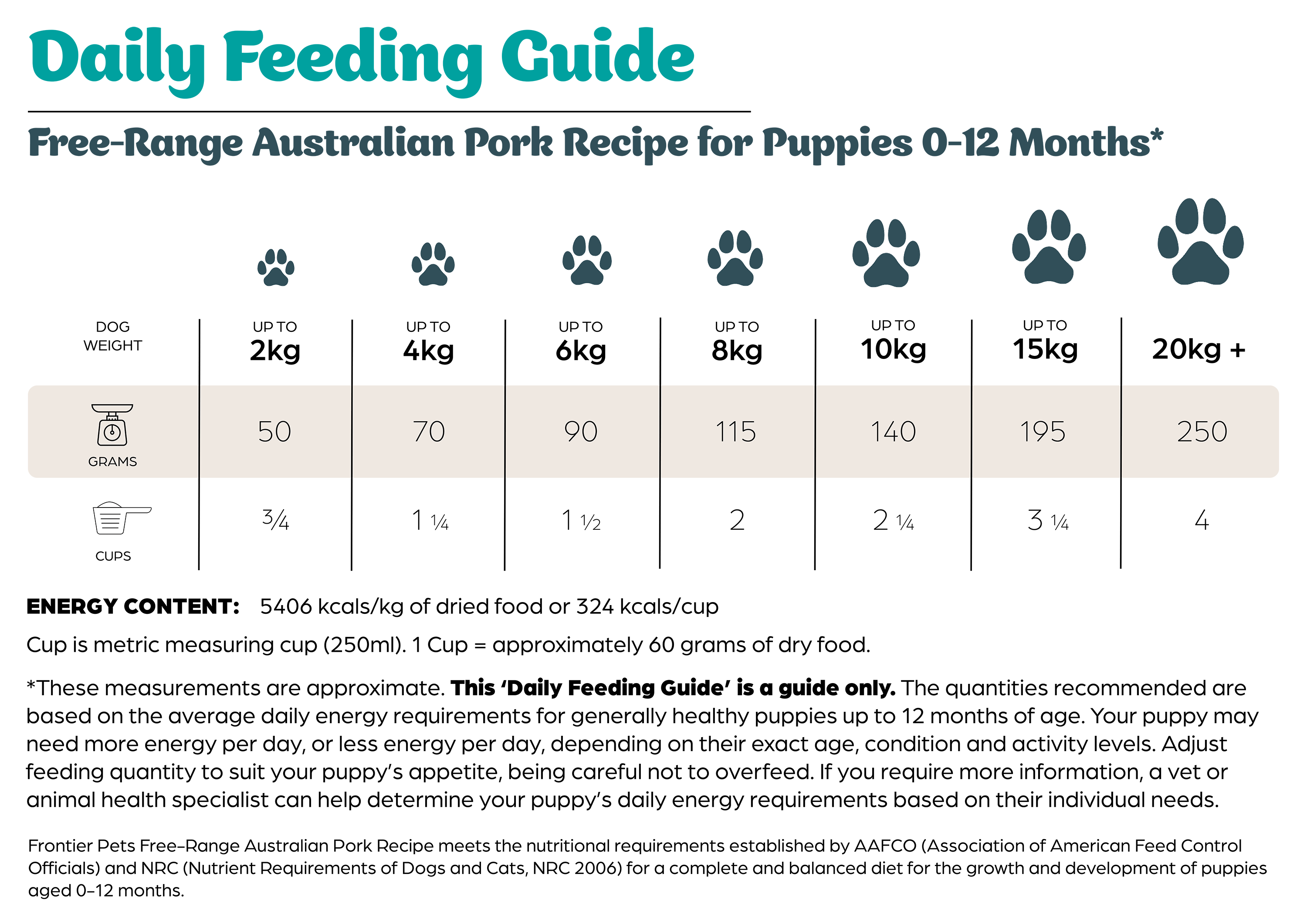
Shop Puppy Combo Pack
Shop the Puppy Combo Pack and let your puppy enjoy a taste of every option!
Feeding your puppy the right amount is super important for their growth and energy levels. To make it simple, check our feeding guide above and divide the recommended daily amount into 2-4 smaller meals if your puppy is still young. This helps keep their energy steady all day long!
For easy measuring, use a standard metric measuring cup — 1 cup is about 60 grams of dry food. Make sure to adjust the portions based on how active your puppy is and how they’re growing.
It’s also a good idea to keep an eye on your puppy's weight and body condition. Fresh water should always be available, and if you’re ever unsure about how much to feed, a quick chat with your vet can help you figure things out.
Frequently Asked Questions
Our holistic vet recommends transitioning your puppy from Puppy Food to Adult Frontier Pets food based on their breed size:
- Small breeds (under 10kg full-grown): 9-10 months old
- Medium breeds (10-20kg full-grown): 12-15 months old
- Large breeds (over 20kg full-grown): 14-24 months old
Our puppy food is specially formulated with green-lipped mussels to provide essential nutrients for your growing pup. It's crucial to feed puppy food during this growth phase to ensure they receive the optimal nutrition.
The information provided here is general advice. Each pet is unique, so it's always wise to consult your veterinarian for personalised advice, especially if you have concerns about your pet's dietary needs or if they have experienced adverse reactions to previous diets.
The ideal feeding schedule for a puppy depends on their age. New puppy parents usually meet their puppy after 8 weeks, once they have had their second vaccination. Here is some important information for new puppy owners.
- 8-12 weeks: Due to their tiny stomachs and high energy needs with all that growing to do, puppies this age thrive on 4 meals a day. These meals should be evenly spaced throughout the day, say every four hours, with an overnight fast of around 8 hours. During this time, it is important to first use the food they were getting before and slowly start to change them to your food of choice. Take it slowly when making the changes, as these little bodies have a lot going on and need time to adjust.
- 3-6 months: As growth slows down, gradually reduce feeding to 3 meals a day: approximately five to six hours between meals, with an overnight fast, works well. By six months of age, they can fully transition to the food of your choice.
- 6+ months: Most puppies can transition to a twice-a-day feeding schedule, typically morning and evening, with an overnight fast. The last meal is two hours or more before bedtime to aid nighttime toileting habits.
Important to note: This is a general guideline only. Consult your vet for specific advice regarding the ideal feeding schedule and the right amount of food for your puppy.
Exposing your puppy and adolescent to various flavours and textures in their food is important to provide nutritional variety and enrichment and prevent fussiness. We recommend healthy pups try all the various flavour varieties in our range. Giving them other foods, especially bone and chewy treats, is great, too.
You don't necessarily need to change your puppy's diet frequently, but you will need to transition them from puppy food to adult food at some point. Puppies grow rapidly, so they have different nutritional needs than adult dogs. Puppy food is formulated to have higher energy and protein to support this growth. They also need more minerals for all the bones they are busy making larger and some extra fatty acids for brain growth, which is why we add extra nutrition and ingredients, including green-lipped mussels, to our puppy foods.
The timing of the switch to adult food depends a little on your puppy's breed size, with most dogs switching from puppy to adult food between 12 and 18 months of age. Staying on puppy food is not appropriate for an adult.
- Smaller breeds (under 10kg) can typically transition around 1 year old.
- Larger breeds (over 25kg) may need puppy food until 18 months old.
Seek advice from your vet about what is best in your situation.
- When it’s time to change their food, transition them slowly into adult food, don't abruptly switch your puppy's food.
- A sudden change can upset their digestion, resulting in digestive upsets.
- You can start by mixing a small amount of adult food with their regular puppy food, slowly increasing the amount of adult food each day.
- Gradually introduce about 25% of the adult food to the puppy food for the first week and then increase each week, fully switching them over in about a month.
A healthy, well-fed puppy should meet its growth milestones in weight and size. They should be growing steadily in size and weight each week. They should not be allowed to be too fat. Our puppy daily feeding guide provides a general guideline based on how much food a pup of a particular weight needs daily.
If your puppy is getting fat or growing too fast, feed less. If your pup is not growing enough or is too thin, feed more. While puppy food packaging provides feeding guides, these are just a starting point. It's always best to monitor and adjust how much to feed your pup. It will depend on their age, breed, and activity level. It is important to check with your vet if you have any concerns.
Here are some signs that your puppy might not be getting enough food:
- Your puppy is hungry all the time, begging for food or stealing food from others. This is a sign that your pup is hungry and looking for more to eat.
- Your puppy looks thin, and its ribs stick out. Puppies should have a healthy weight and a slight hourglass figure when viewed from above. Their ribs should be palpable but not visible. If their ribs are easily visible, they might be underfed.
- Your puppy's growth seems slow. If your pup isn't growing at the expected rate for their breed, consult your veterinarian to rule out any underlying health issues and discuss their diet.
- Your puppy has low energy levels: A well-fed puppy should be full of energy and playful. They will sleep a lot but be bouncy and active when awake. If your pup constantly seems tired, it could be a sign of illness or inadequate feeding. Definitely get them checked out at the vet.
Look for whole food ingredients that sound healthy and appropriate for a pup: things like meat, fish, eggs, offal, bones, fruits and vegetables, seeds and nuts. Avoid strange chemicals and things you’ve never heard of and have trouble pronouncing. Avoid diets based on grains and cereals, as these are not natural foods. Avoid by-products and “meals”. ‘Meals’ are a dried powder of animal parts; for example, chicken meal is not the same as whole chicken or chicken meat
The ingredients on pet food packets are first listed in order of main ingredients through smaller amounts of ingredients. Therefore, healthy food should include whole meats of various types, fish, eggs, offal, and bones in the first few ingredients. There will also be vegetable material like fruits and vegetables, seeds, and nuts
Check the food is complete and balanced for puppies.
What does complete and balanced mean?
This means that the food contains all the nutrients that a puppy needs as set down by one of the International Standards organisations: the Association of American Feed Control Officials (AAFCO) USA, the National Research Council (NRC) UK, or FEDIAF (Europe). Check the labels to see if the food qualifies. Consider seasonal dog food options if that aligns with your preferences.
Finally, if your pup is a picky eater, consider offering a variety of textures (like mixing texture treats like small chicken neck with wet food) or experimenting with feeding schedules to find what works best. For an extra nutritional boost, look for food that includes high-protein, free-range meat sources – this potentially indicates a healthier and more sustainably-source of protein for your growing pup.
Puppies need fresh, clean water that is available at all times. Water can be taken up overnight in winter to aid with toilet training. The amount they drink can vary depending on their activity and the climate. A good starting point is 30-50 millilitres (ml) of water per kilogram (kg) of body weight per day is a good rule of thumb. Active puppies or those in hot weather will need more.
Like a baby, a well-hydrated puppy should pee at least 6-10 times daily.
Since Frontier Pets puppy food comes dry, adding water helps with hydration. Mixing water with freeze-dried raw food makes it easier to digest and ensures your pup gets enough fluids.
Here are some ways to keep your puppy hydrated:
- Keep their water bowl full of fresh, clean water at all times.
- Offer water throughout the day, even if they don't seem thirsty.
- You can make water more enticing by adding a bit of low-sodium chicken broth or milk (lactose-free or puppy milk if desired).
- If you're worried your puppy isn't drinking enough, talk to your veterinarian.

